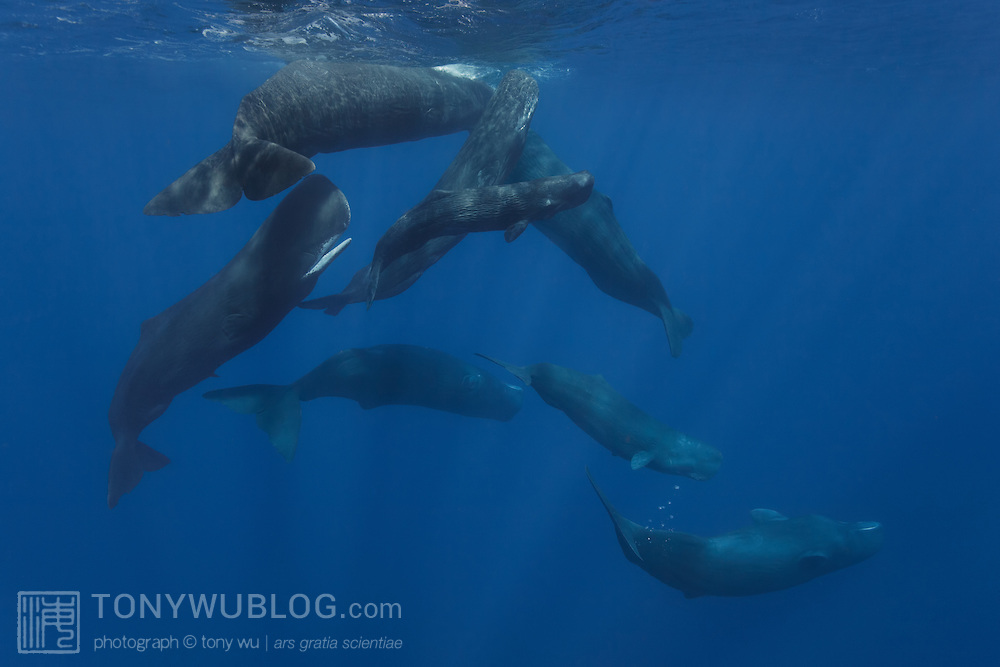

Sperm Whales Congregate in Click-Based Cliques
抹香鲸也会找知己
撰文/播音 Christopher Intagliata
翻译 张旭阳
审校 杨一森 李轩
The whales appear to prefer the company of "like-minded" individuals, based on common vocal clicking behavior — an example of culture, researchers say. Christopher Intagliata reports
研究人员表示,鲸似乎更愿意跟有着相似轻唱行为的同类相处。这是鲸群中的一种文化。
We humans are social creatures—we stick together. Family traditionally came first. Then more distant relatives. Then larger groups of unrelated individuals, connected by culture. But it turns out the same could be said for sperm whales. "So usually you find the female, and their mom and the grandmas and their aunts, and they all stay together for many years."
我们人类是社会性生物——我们相互扶持、团结一致。传统观念中,家庭才是第一位的,排在家庭之后的是距离稍远的亲戚,而大批靠文化联系的没有亲缘关系的人就要再靠后站了。对抹香鲸来说,这样的亲疏关系同样适用。“所以你经常会发现雌性抹香鲸会和它们的母亲、外婆以及七大姑八大姨共同生活好多年。”
Maurício Cantor, a biologist at Dalhousie University in Halifax, Nova Scotia. He says those closely related family groups then seek out other families with similar behavior: "They tend to hang out or stay together with those who produce the same kinds of sounds." <
戴尔豪斯大学的生物学家毛利西奥? 康托(Maurício Cantor)说,那些联系密切的家庭群体会寻找行为类似的其他家庭群体:“抹香鲸们喜欢跟声音相似的同类一起玩耍或相处。”这意味着鲸的圈子是靠相似发声维系的。
And similarly clicking whales don't just hang out together, he says. They also emulate each other's songs, or codas. Meaning clans of whales evolve their own dialects—their own form of culture. And these dialects are key. Cantor and colleagues built a computer simulation of generation after generation of virtual whales. And they found that no other factor—like genetics or mother-daughter teaching—could explain the emergence of the clans and dialects in real sperm whale society. The study appears in the journal Nature Communications. [Mauricio Cantor et al, Multilevel animal societies can emerge from cultural transmission]
康托还表示,发声相似的鲸不仅仅会一起游戏,它们还会模仿彼此的歌声或尾音。 这也就意味着鲸的氏族会发展出它们独有的方言——它们独有的文化形式。这些方言十分关键。Cantor和它的同事用计算机模拟了虚拟鲸的世代繁衍 。他们没有发现其他因素比如基因或家庭教育,可以解释鲸类氏族的起源以及真实抹香鲸社会中的方言。研究成果发表在《自然?通讯》(Nature Communications)杂志上。[Mauricio Cantor et al, Multilevel animal societies can emerge from cultural transmission]
"I'm not trying to say that the types of culture the whale has are the same as human culture. Obviously human culture is much more diverse and complex and cumulative and symbolic. But it's very fascinating just to see that they can have some type of similarities, they can have their own type of culture." And maybe a better understanding of that whale culture, he says, might persuade a few human cultures to be a bit more conservation-minded, when it comes to whales.
“我并不是要试图说明鲸的文化和人类的文化相同。很显然,人类的文化更为复杂多变,更具累积性与象征性。但是发现抹香鲸与我们的某种相似性,发现抹香鲸也拥有自己的文化,这是一件令人称奇的事。” 康托说。他还认为,更好地理解鲸的文化可能会说服处于某些文化 下的人能用保护的眼光看待鲸。
 京公网安备11010502039775号
京公网安备11010502039775号